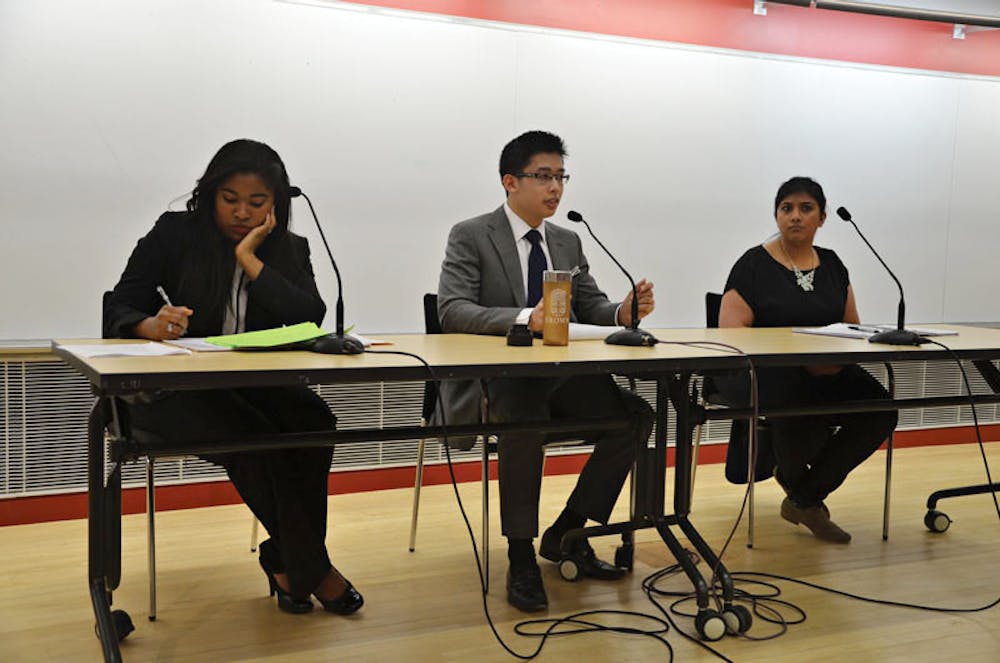Candidates for leadership positions on the Undergraduate Council of Students and the Undergraduate Finance Board used Thursday night’s debate to push their platforms and address a host of issues, such as the role of student government, mental health resources and adding a student representative to the Corporation.
Asia Nelson ’15, Maahika Srinivasan ’15 and Jonathan Vu ’15 faced off in the UCS presidential debate, often focusing on the Council’s ability to directly influence administrators to improve student resources. Alex Drechsler ’15 and Sazzy Gourley ’16 debated their platforms for the UCS vice presidency, while Alex Sherry ’15 and Dakotah Rice ’16 outlined their uncontested campaigns for UFB chair and UFB vice chair, respectively.
The Council’s relationship with the student body drove much of the discussion among UCS presidential candidates.
“UCS isn’t necessarily pushing its boundaries and its limits currently, and I think there’s a lot that we could be doing in terms of integrating other community organizations,” said Nelson, a UCS general body member. Nelson emphasized the importance of reaching out to other student groups to “make sure that all students on campus feel represented.”
“The first role of UCS is to be seeking out student opinion,” said Srinivasan, chair of the UCS Academic and Administrative Affairs committee. “We should be asking people what they need and what they want and how they want it,” she said, adding that she aims to “cultivate a cohesive community” by “bringing in as many … diverse perspectives into the room” as possible.
Vu, the class of 2015 president and a former UCS alumni liaison, urged Council members to get “out of Petteruti Lounge (and) onto the Main Green” by holding events and forums besides general body meetings.
UCS presidential candidates highlighted different priorities unique to their campaigns.
Nelson said she hopes students will use the hashtag “Brown See It Say It” to report their concerns to the Council. The hashtag would boost the Council’s “accessibility and accountability” and set it “in the right direction in terms of amplifying student voices,” she said, adding that this technique would highlight issues “that are happening in our daily lives that the administration may not know are happening to us.”
In light of the University’s impending capital campaign, Vu stressed the importance of implementing universal need-blind admission to “ensure the future of not only the students that are here but the students to come.” He also described plans to reform dining options to more accurately “reflect the desires of students.”
Srinivasan said while advising is not a particularly “sexy” topic, it “affects every Brown student’s experience at some point.”
“We just need a support system and a network that will carry us through all four years,” she said, urging improvements in concentration advising and adviser training.
Though the three UCS presidential candidates differed in their individual priorities, all expressed support for greater diversity among Psychological Services staff members and the addition of a student representative to the Corporation.
Srinivasan said she thinks the Corporation’s lack of a student representative is “ridiculous.”
In the UCS vice presidential debate, Drechsler and Gourley squared off over mental health resources and transparency in University governance.
Gourley outlined ways in which “Psych Services can be more accessible,” saying it must “hire the staff that they need to represent the student body as a whole.”
Drechsler expressed concern over how “when you call Psych Services, they ask you directly, ‘Do you have an emergency?’” rather than conducting more comprehensive assessments like those on which many peer institutions rely. He encouraged Psych Services to place more patients at professional, off-campus facilities.
Gourley described the “importance of exploring as an undergraduate all the things that make an undergraduate education have value.” Discussing his intention to be a receptive leader, he said he would “prioritize what the students want to see.”
“Administrators really consider UCS to be the voice of the students,” Drechsler said. “We need to act like that’s our role and make sure that we’re doing that.” He also acknowledged his leadership of the undergraduate group working with UCS to get a student representative added to the Corporation. If elected, Drechsler would continue to work on “making sure” that plan becomes a reality, he said.
Candidates for UFB leadership positions proposed specific ideas for streamlining the student group funding process.
Sherry, UFB vice chair and the only candidate for UFB chair, said he would work to ensure the Board was “responsive to the student body.” He added that he would strive for “positive and hopefully stress-free interactions with UFB” and ensure student groups applying for funding would “receive the best possible advice.”
Uncontested UFB vice chair candidate Rice, a UFB representative, described plans to “write a really accessible guide where people can really understand how to navigate” the student group funding process.
The debate was sponsored by the Undergraduate Council of Students and The Herald and moderated by current UCS President Todd Harris ’14.5 and Herald Editor-in-Chief Eli Okun ’15.

ADVERTISEMENT




